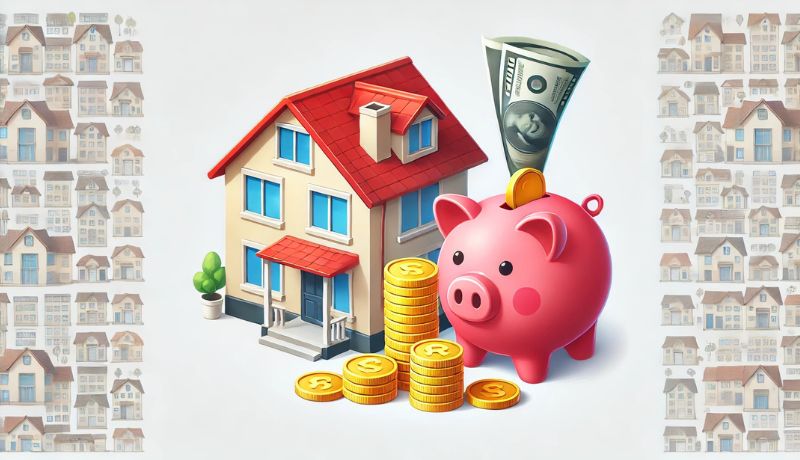
Are you tired of feeling stretched thin between family and finances? Imagine a steady stream of income flowing into your bank account—without having to sacrifice precious time with your kids. That’s the power of real estate investing.
Real estate has always been one of the most appealing ways to generate passive income—especially for moms juggling work, family, and everything in between. Rental income can provide financial security, flexibility, and long-term wealth, making it a smart option for moms seeking financial independence.
Imagine having a steady flow of rental income hitting your bank account every month. For moms craving work-life balance, real estate offers the flexibility to be present for those precious family moments while still making smart money moves.
Beyond the immediate cash flow, property ownership can serve as a financial safety net, helping you plan for the future. Whether it’s saving for college, paying off debt, or securing retirement, rental income can play a crucial role in building long-term stability.
👉 If you’re looking to grow your savings, check out my post on smart investing strategies for moms.
How Rental Income Works: Real Estate Investing Tips for Moms

Crunching the numbers on rental income might sound intimidating, but it’s actually pretty straightforward.
1️⃣ Choose the Right Type of Property
Decide what kind of property suits your plan:
- Single-family homes – Easier to manage but lower rental yields.
- Multi-family units – Higher cash flow but more maintenance.
- Commercial properties – Higher earning potential but more complex to manage.
2️⃣ Understand the Financial Math
Knowing how to calculate key financial figures will help you make smarter decisions:
👉 Cap Rate (Capitalization Rate): Measures how much money your property makes compared to its value. A higher cap rate means a better return.
Formula: (Net Operating Income ÷ Property Value) × 100
♦ Example: If you purchase a property for $200,000 and it generates $12,000 a year after expenses, your cap rate would be 6%—a solid return.
👉 Cash Flow: The money left after expenses.
Formula: Total Rental Income – (Mortgage + Taxes + Insurance + Maintenance)
♦Example: If your rental income is $1,500/month and your expenses total $1,000/month, your cash flow is $500/month—money that can cover household expenses or go into savings.
👉 ROI (Return on Investment): Measures how much profit you make based on your initial investment.
Formula: (Annual Income – Expenses) ÷ Total Investment × 100
♦Example: If you invested $50,000 in a rental property and it generates $6,000 annually after expenses, your ROI would be 12%—much higher than typical stock dividends.
You can also explore multifamily real estate investing as a strategy to build passive income while managing fewer individual tenants.
3️⃣ Long-Term vs. Short-Term Rentals
- Long-term rentals – One tenant for several months or years, providing stability.
- Short-term rentals – Higher per-night income but more effort (think Airbnb).
Lisa, another mom I know, turned her inherited home into a rental instead of selling it. After doing some research, she realized she could bring in an extra $1,500 a month—money that helped her afford a better school for her kids.
Instead of letting the property sit unused, she leveraged it as an income stream.
If you’re looking for more passive income strategies, check out these legitimate ways for moms to make passive income.
4️⃣ Account for Vacancy Rates and Expenses
Vacancy periods are inevitable, so it’s essential to have a financial cushion. Also, factor in maintenance costs, property taxes, and insurance to calculate your real returns.
Understanding rental yield (annual rental income ÷ property cost) will give you insight into your potential ROI.
5️⃣ Know the Legal Side
Rental regulations vary by location. Ensure you’re aware of licensing, local taxes, and tenant rights to avoid legal headaches down the road.
The Pros of Rental Income: Why Moms Are Taking the Leap

Rental income can be a game-changer for moms looking to create financial independence. Once the property is set up and a tenant is settled in, it requires minimal day-to-day involvement.
✅ Property Appreciation
Real estate typically increases in value over time, helping you build long-term wealth. Even if the rental income just covers expenses initially, rising property values over the years can lead to significant equity growth.
♦Example: Sarah purchased a rental property for $150,000. Ten years later, it was valued at $250,000, even though the mortgage was already partially paid down with rental income. That’s $100,000 in equity growth on top of the monthly cash flow!
✅ Tax Advantages
One of the most overlooked yet powerful benefits of real estate investing is the tax advantages. Rental properties offer several ways to reduce your tax burden and maximize your returns:
📌Mortgage Interest Deduction
You can deduct the interest you pay on your mortgage loan from your taxable income, lowering your overall tax bill.
📌Property Tax and Operating Expense Deductions
Expenses like maintenance, repairs, property management fees, insurance, and utilities are deductible.
📌Depreciation
Even though your property may appreciate over time, the IRS allows you to deduct a portion of the property’s value as depreciation each year.
Residential property is depreciated over 27.5 years.
♦Example: If your property is worth $275,000 (excluding land), you can deduct $10,000 per year ($275,000 ÷ 27.5).
📌1031 Exchange
This is a major advantage for long-term wealth building. A 1031 exchange allows you to sell one investment property and reinvest the proceeds into another “like-kind” property without paying capital gains taxes at the time of sale.
♦Example: Lisa sold her first rental property at a $50,000 profit but avoided paying capital gains tax by rolling the funds into a new multi-family property.
📌Passive Loss Deductions
If your rental property generates a paper loss (due to depreciation or other expenses), you may be able to deduct that loss against other income, reducing your overall taxable income.
♦Example: Anna’s rental property showed a $5,000 paper loss after depreciation and expenses, which reduced her overall tax bill by $1,500.
🎯 Bonus Tip: If you actively participate in managing the property, you may be able to deduct up to $25,000 in rental losses against other income—check with a tax professional to confirm eligibility.
📌Capital Gains Exclusion (If You Live There First)
If you have lived in the property for at least two out of the last five years before selling, you may qualify to exclude up to $250,000 ($500,000 for married couples) of capital gains from taxes.
Consulting a tax professional who specializes in real estate can help you structure your investments to maximize these benefits.
✅ Effortless Management
You don’t need to be on-site to manage a rental. With the right property management app, you can handle:
✔ Tenant communication
✔ Rent collection
✔ Maintenance requests
✔ Bookings for short-term rentals
♦Example: Mia, a mom with two young kids, manages her two rental properties using an app that automates rent collection and maintenance requests. She spends less than 30 minutes a week managing her properties, giving her more time with her family.
Real-Life Success Stories

Sometimes, hearing about someone else’s success is exactly what we need to believe it’s possible for us too.
These moms didn’t start with endless resources or perfect circumstances—but through smart decisions and persistence, they turned real estate into a powerful source of financial freedom.
Their journeys prove that with the right mindset and strategy, you can make real estate work for you too.
1️⃣ Mindy Jensen
Mindy’s real estate journey started back in 1998, when she bought her first rental property. At the time, she wasn’t sure where it would lead—but she saw potential. Through careful property selection and strategic management, Mindy built a thriving real estate portfolio that now generates significant passive income.
Today, as the co-host of the BiggerPockets Money podcast, she openly shares her journey to building a seven-figure net worth and helps others navigate the path to financial independence.
2️⃣ Kathy Fettke
Kathy’s story is one of resilience and hope. When her husband was diagnosed with cancer, their family faced a frightening financial future. That’s when Kathy turned to real estate investing—not just to survive, but to create lasting security for her family.
She built a successful rental property portfolio that now generates consistent passive income, allowing her family to thrive even through tough times. Kathy’s experience shows how real estate can be a lifeline during life’s hardest moments.
3️⃣ Tasha Cochran
Tasha knew the traditional 9-to-5 life wasn’t working for her anymore. As a busy mom, she dreamed of more time with her kids—but walking away from a stable job felt risky. That’s when she discovered real estate.
By investing in rental properties, Tasha was able to transition out of her corporate job and build financial independence. Now, as the founder of One Big Happy Life, she helps other moms take control of their finances and build the life they want.
These moms started with different circumstances but shared the same goal: creating financial freedom through real estate. If they could do it, so can you.
⭐Start by exploring rental properties in your area or talking to a real estate agent to discuss options.
Challenges and Considerations: Navigating the Real Estate Landscape

While the rewards can be significant, real estate investing isn’t without its challenges. Being prepared for potential pitfalls can help you avoid costly mistakes and set yourself up for long-term success.
🚧 High Upfront Costs
The initial investment can be steep, with down payments, closing costs, and potential renovations quickly adding up. However, there are ways to make it more manageable:
✔️ FHA Loans – Allow for down payments as low as 3.5%, making real estate investing more accessible for moms with limited capital.
✔️ House Hacking Strategy – Live in one unit of a multi-family property while renting out the others to cover the mortgage.
✔️ Owner Financing – Some sellers offer direct financing, bypassing the need for a traditional mortgage.
✔️ HELOC (Home Equity Line of Credit) – If you own a home, you can tap into your home’s equity to fund an investment property.
🎯 Tip: Start small with a property that requires minimal renovations to keep upfront costs under control.
🚧 Tenant Issues
Finding and managing tenants can be tricky—but the right approach reduces risk.
Jenna’s Experience:
Jenna, a mom I know, had a tenant skip out on rent, leaving her scrambling to cover the costs. After that experience, she learned the importance of thorough tenant screening and securing a backup fund for emergencies.
Common Tenant Mistakes to Avoid:
📌 Failing to Screen Tenants
Lisa rushed to fill a vacancy without checking references. The tenant stopped paying rent after three months, forcing Lisa to go through a costly eviction process. Now, she requires background checks, credit checks, and references before signing any lease.
📌 Lack of a Lease Agreement
Without a written lease, you have no legal protection if a tenant damages your property or refuses to leave.
🎯 Tip: Use a professional lease agreement template and require a security deposit to protect your interests.
🚧 Underestimating Maintenance Costs
Maintenance costs can quickly eat into your profits if you’re not prepared.
Anna’s Experience:
Anna didn’t budget for maintenance and was hit with a $5,000 roof repair just six months after renting out her property. Now, she sets aside 10% of her monthly rental income for repairs and ongoing maintenance.
🎯 Tip: Create a dedicated maintenance fund and budget 1%–2% of the property’s value annually for repairs and upkeep.
🚧 Not Understanding Local Laws
Rental regulations vary by location, and ignorance isn’t an excuse for violating them.
Mia’s Experience:
Mia purchased a duplex and started renting it out without realizing her city required a rental license. She was fined $2,000 and had to temporarily stop renting until she completed the licensing process.
🎯 Tip: Before renting out a property, research local laws regarding:
- Rental licensing requirements
- Tenant rights and eviction processes
- Short-term rental restrictions (if using platforms like Airbnb)
🚧 Market Risk
Property values can be unpredictable. Economic downturns or neighborhood changes can affect rental rates and your property’s value.
Lisa’s Experience:
Lisa bought a rental property in an up-and-coming area, but after a major employer shut down nearby, rental demand plummeted. She had to lower her rates and adjust her cash flow expectations.
🎯 Tip: Research neighborhood trends, local job markets, and the housing supply-demand balance before buying. A financial buffer (3–6 months of expenses) can help you weather market downturns.
✅ How to Overcome These Challenges
✔️ Start small with a manageable property.
✔️ Build a financial cushion to cover vacancies and repairs.
✔️ Conduct thorough tenant screening and use a solid lease agreement.
✔️ Research local regulations and market trends before investing.
✔️ Work with a real estate advisor or property manager if you’re unsure.
Scaling Strategy: Growing Beyond One Property

Once you’ve established one successful rental, it’s time to think about growth. Expanding your portfolio can increase your income and create long-term wealth.
Here are smart ways to scale up:
1️⃣ Reinvest Profits
Use the cash flow from your current property to fund the down payment or improvements on your next investment. This creates a self-sustaining cycle of growth.
2️⃣ BRRRR Strategy
This proven method helps you maximize your capital and grow your portfolio quickly:
- Buy – Purchase a property below market value (often a fixer-upper).
- Rehab – Renovate and increase the property’s value.
- Rent – Find tenants and create a steady cash flow.
- Refinance – Take out a new mortgage based on the property’s increased value, pulling out your initial investment.
- Repeat – Use the refinanced funds to buy your next property and start the cycle again.
3️⃣ Joint Ventures
Partner with other investors to pool resources and reduce the financial burden. This allows you to access higher-value properties and share management responsibilities.
4️⃣ Expand to Commercial
Commercial properties (like office buildings and retail spaces) often provide higher rental yields and longer lease terms, but they require more complex management and financing strategies.
📍 Note: Larger multi-family and commercial properties often require different types of financing and a more strategic management approach. Working with an experienced property manager or real estate advisor can help you navigate these complexities.
⭐You don’t need to be a real estate expert to grow your portfolio—start small, learn as you go, and adjust your strategy along the way.
When to Avoid Real Estate Investing
Real estate isn’t for everyone. Consider avoiding it if:
❌ You’re already carrying high debt or lack an emergency fund.
❌ You can’t handle the stress of market fluctuations or tenant issues.
❌ You don’t have the time or resources to maintain a property or hire a manager.
FAQ (Frequently Asked Questions)
❓Is real estate investing good for moms?
💡 Yes! Real estate investing provides moms with financial independence and flexibility.
Once a tenant is in place, rental income can create a steady cash flow with minimal day-to-day involvement—giving you more time to focus on your family while building long-term wealth.
❓How much money do I need to start investing in real estate?
💡 It depends on the property type and financing method. FHA loans allow down payments as low as 3.5%, making it easier to enter the market even with limited capital.
You can also explore options like house hacking (living in one unit while renting out the others) or owner financing to reduce upfront costs.
❓Can I manage rental property remotely?
💡 Yes! Property management apps like Avail or Buildium make it easy to handle bookings, rent collection, and maintenance requests from anywhere.
Hiring a property manager is another option if you prefer a hands-off approach.
❓What if I can’t afford a property in my area?
💡 Real estate investing doesn’t always require large upfront capital. If local properties are too expensive, consider house hacking, looking into FHA loans, or investing in out-of-state markets where property prices are more affordable.
You can also invest in REITs (Real Estate Investment Trusts) for as little as $100 without managing a property directly.
❓How do I handle difficult tenants?
💡 Start with a thorough tenant screening process, including background checks and references. Have a clear lease agreement that defines rules, payment schedules, and penalties.
Use a property management app to streamline communication and rent collection. If issues persist, consult local eviction laws and seek legal guidance if necessary.
Getting Started: Practical Steps for Moms Entering Real Estate Investing

Kicking off your real estate journey might seem overwhelming, but breaking it down into steps makes it easier:
Research neighborhoods with high rental demand and growth potential.
✅ Consider house hacking—live in a part of the property and rent out the rest.
✅ Explore Real Estate Investment Trusts (REITs) if you prefer a hands-off approach.
✅ Start small—rent out a spare room or basement as a short-term rental.
✅ Build a support network by joining online communities and connecting with other moms in real estate.
👉Ready to explore real estate? Start by researching rental demand in your area!
Conclusion: Is Real Estate Investing Right for You?
Rental income has the potential to provide moms with financial security, flexibility, and long-term wealth—but it comes with its fair share of challenges. If you’re willing to do the research, plan strategically, and prepare for ups and downs, real estate investing can be an incredibly rewarding journey.
Are you ready to explore real estate as a passive income opportunity? Start small by researching properties in your area or connecting with a local real estate group.
👉If you found this helpful, share it with another mom who might benefit from this strategy!
This is a very comprehensive and encouraging guide to real estate investing for moms!
You’ve effectively highlighted the potential benefits, including financial independence, flexibility, and long-term wealth building, while also acknowledging the inherent challenges.
I appreciate the breakdown of key financial concepts like cap rate, cash flow, and ROI, as well as the practical tips for choosing property types and managing rentals. The inclusion of real-life success stories and advice from experienced investors adds credibility and relatability.
The section on tax advantages is particularly valuable, as it’s often an overlooked aspect of real estate investing. And the “When to Avoid Real Estate Investing” section provides a balanced perspective, ensuring readers understand the potential risks.
However, a few questions come to mind: Given the time constraints and potential childcare responsibilities of many moms, what strategies do you recommend for effectively managing rental properties while minimizing time commitment?
With the increasing focus on sustainable and eco-friendly living, are there any specific property features or renovation strategies that can enhance a rental property’s appeal to environmentally conscious tenants?
What are your thoughts on the impact of current market fluctuations on rental income? Do you think the potential for passive income offsets the risk of market volatility?
Phil
Thank you so much, Phil! I really appreciate your thoughtful feedback and insightful questions.
You bring up a great point about time constraints for moms managing rental properties. Some effective strategies to minimize time commitment include hiring a property management company, automating rent collection and maintenance requests, and investing in turnkey properties that require less hands-on involvement.
For those who prefer a more active role, starting with a local rental and outsourcing specific tasks like repairs can help strike a balance.
Regarding eco-friendly features, sustainable upgrades like energy-efficient appliances, solar panels, and water-saving fixtures can attract environmentally conscious tenants. Additionally, using non-toxic paints, recycled materials, and smart home technology can enhance appeal and even justify premium rental rates.
As for market fluctuations, real estate always has its risks, but rental properties tend to remain relatively stable compared to other investments. Choosing properties in high-demand areas with strong job markets and diversifying rental income sources (e.g., long-term vs. short-term rentals) can help mitigate volatility.
While short-term market dips may occur, real estate historically appreciates over time, making it a solid long-term wealth-building strategy.
Thanks again for your thoughtful questions—I’d love to hear your take on these perspectives!
This article really got me thinking about how real estate investing can be a game-changer for busy moms. The way it breaks down rental income—from choosing the right property to managing cash flow and tenant issues—makes it feel like a very accessible path to financial stability.
It’s inspiring to see real-life examples of moms who’ve used rental income to not only cover everyday expenses but also build long-term wealth.
I’m curious, has anyone here started small with a single property or used house hacking to ease into it? Your insights and experiences would be really valuable!
Hi Dan,
I’m so glad this article got you thinking about the possibilities of real estate investing for busy moms! Rental income can definitely be a powerful tool for financial stability and long-term wealth, especially when approached strategically.
House hacking is such a smart way to ease into real estate investing—I’d love to hear from moms (or anyone!) who have started this way. Whether it’s renting out part of a home or starting with a small rental, every journey is different, and learning from each other’s experiences is invaluable.
Have you considered getting into real estate yourself? If so, what’s your biggest question or concern about getting started?
Looking forward to hearing more! 😊